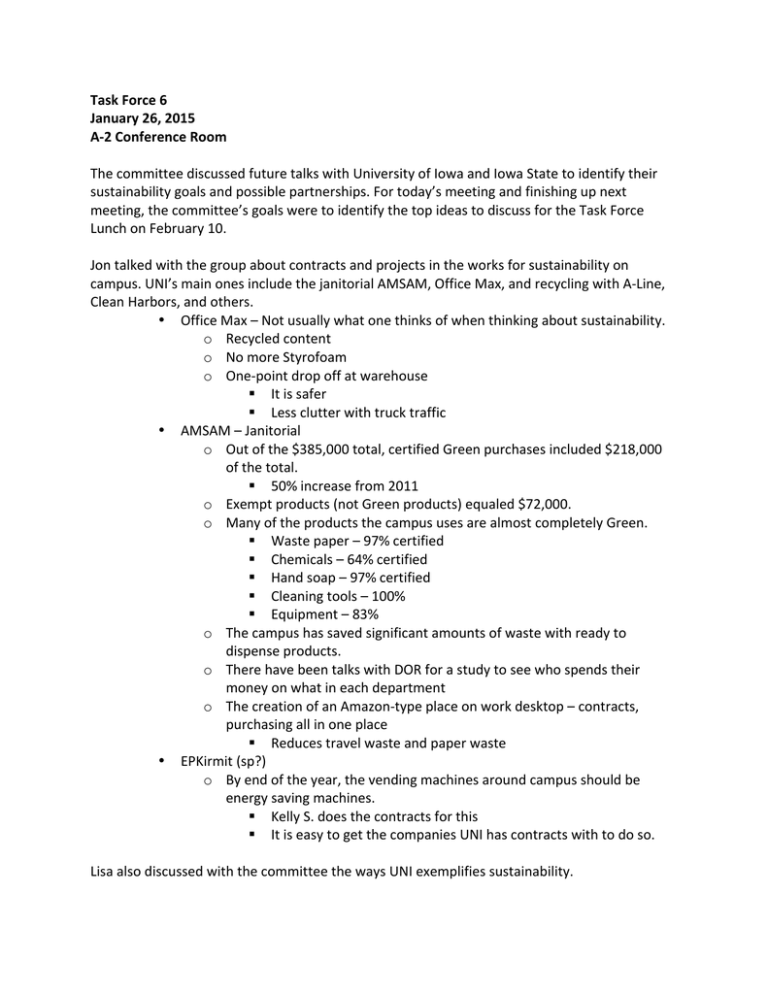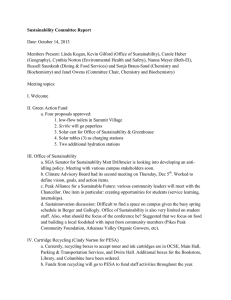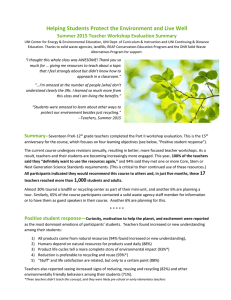Document 10986335
advertisement

Task Force 6 January 26, 2015 A-­‐2 Conference Room The committee discussed future talks with University of Iowa and Iowa State to identify their sustainability goals and possible partnerships. For today’s meeting and finishing up next meeting, the committee’s goals were to identify the top ideas to discuss for the Task Force Lunch on February 10. Jon talked with the group about contracts and projects in the works for sustainability on campus. UNI’s main ones include the janitorial AMSAM, Office Max, and recycling with A-­‐Line, Clean Harbors, and others. • Office Max – Not usually what one thinks of when thinking about sustainability. o Recycled content o No more Styrofoam o One-­‐point drop off at warehouse ! It is safer ! Less clutter with truck traffic • AMSAM – Janitorial o Out of the $385,000 total, certified Green purchases included $218,000 of the total. ! 50% increase from 2011 o Exempt products (not Green products) equaled $72,000. o Many of the products the campus uses are almost completely Green. ! Waste paper – 97% certified ! Chemicals – 64% certified ! Hand soap – 97% certified ! Cleaning tools – 100% ! Equipment – 83% o The campus has saved significant amounts of waste with ready to dispense products. o There have been talks with DOR for a study to see who spends their money on what in each department o The creation of an Amazon-­‐type place on work desktop – contracts, purchasing all in one place ! Reduces travel waste and paper waste • EPKirmit (sp?) o By end of the year, the vending machines around campus should be energy saving machines. ! Kelly S. does the contracts for this ! It is easy to get the companies UNI has contracts with to do so. Lisa also discussed with the committee the ways UNI exemplifies sustainability. • • • • • • • Catering • • • • • • UNI could keep up with new technologies to make sure appliances save water, energy. o The initial cost might be high, but the total cost savings may be worth it. UNI has decreased total packaging materials used o The cafeteria has stopped doing a to-­‐go option ! Made reusable packaging instead and traded it at each lunch purchased. ! 500,000 pieces of packaging saved. Local purchasing options Recycling used frying oil and grease o Joint bid with U of I and ISU o Used for bio-­‐diesel o The university gets paid to recycle it Regarding bids, it’s important to look at sustainability wherever UNI can. o See if the company has a sustainability plan for the project. o The company may continue making sustainability plans for other projects. Recycling, composting programs Residentially o Green chemicals o More efficient lighting Try to grow with these sustainability aspects in the future. Most office/meeting lunches are boxed lunches with plastic ware. o Big opportunity for changes About 7 groups a year use real silverware and plates. Possibly provide a recycling program for each group. o Pick up leftover recyclables, and/or provide each group with recycling bins. o A lot of buildings don’t have good setups for recycling. ! Conference rooms usually don’t have any. This could lead to a slight cost increase, and meetings could resort to other delivery services such as Hyvee. o Could be a requirement that if a group orders food from off-­‐campus they’ll have to make sure that food service has a recycling effort as well. On the catering website, it could be updated for ease and functionality o Make a Green option on the website Brian also discussed city efforts with recycling. • The city wants to expand composting facility and efforts. • The main recycling center has also made improvements. o They have installed a more efficient baler, and increased capacity. o The recycling center can now recycle shingles and all types of glass. • • • ! A potential partnership with UNI o The Cedar Falls recycling center takes saran wrap, grocery bags. ! They’re still figuring out a way to recycling plastic packaging like paper towel and toilet paper packages. The city is has a partnership with City Carton. City Carton recently got bought out and the future of the partnership is unclear. o So far, everything is status quo, but that may change in the future. Walmart has own recycling program. Cedar Valley Recycling takes UNI’s recyclables since it is a single stream recycling. With Cedar Falls Recycling facility, the campus would have to separate all of the recyclables. The committee went around and discussed each member’s thoughts on the top three ideas for sustainability and what could be summarized for the February 10th Task Force Lunch. • Paper use reduction o Possibly enforce a mandate by limiting budget, make a competition with incentives. o Could use a tracking method to see how the university is doing. • Create a suggestion box on the sustainability website. • Food composting • Energy usage o Identify the campus goals and financing for it. o Production o Crowd source a windmill or an efficient boiler. ! Funds from alumni ! Possible partnership with CFU • Windmill o A very large project to consider. • E-­‐procurement o Receipts o E-­‐signatures • Vendors o Cut down the number of vendors UNI uses o Make sustainably friendly contracts, advantageous for UNI • Cut down or eliminate bottled water • End of the year furniture dump from dorms o Repurpose the furniture, or ask students at the beginning of the year if they really need it. • Storm water runoff • Green IT options o E-­‐waste o Manage print options better • Natural landscape management options • LEED campus • o If UNI was made a LEED campus, the certification process would be way easier. Transportation alternatives o Create transportation connections with community o Campus infrastructure ! More bike racks by bus stops. Sustainability is all education – taking ideas and running with them, and getting the word out. Meeting adjourned. The next committee meeting is February 9, from 8:00AM-­‐10:30AM in CBB 327.





